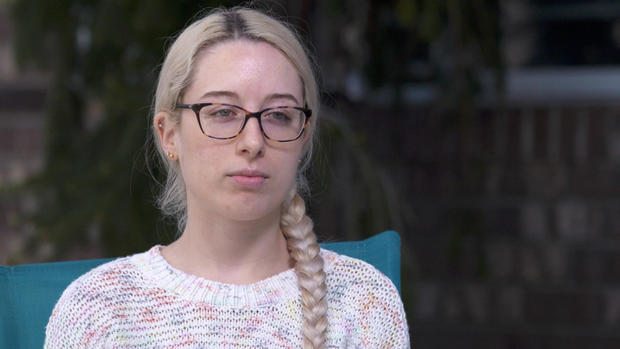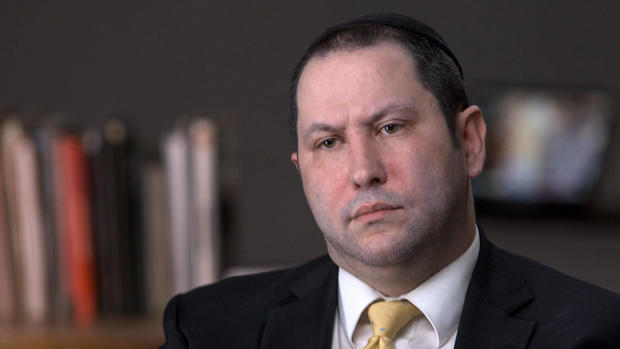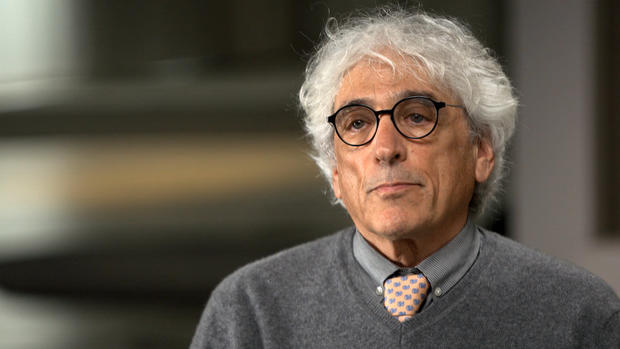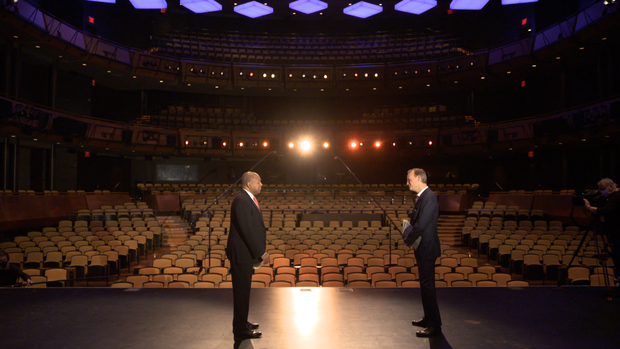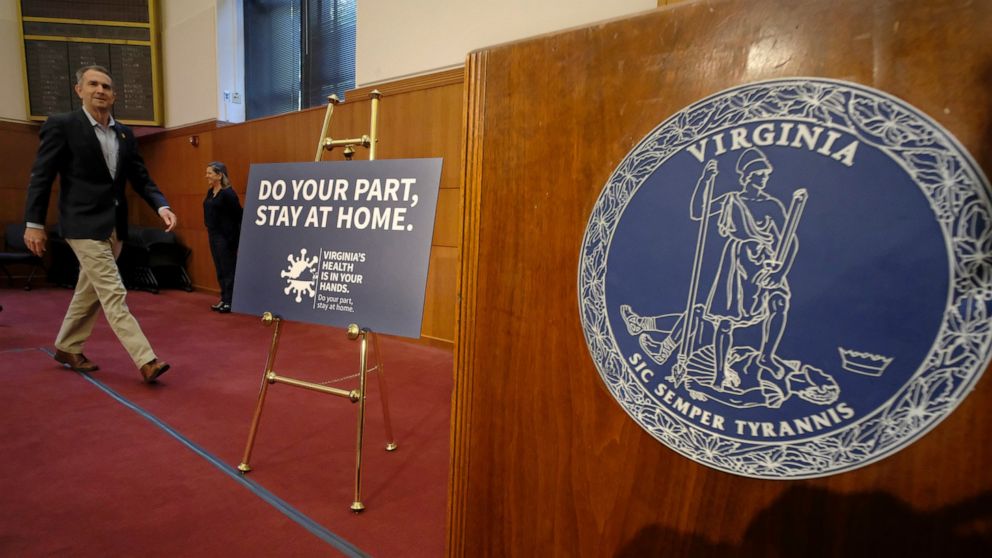Hundreds of millions of Americans are at home. Most of them don’t want to be. Simple choices about what to touch, where to walk and what to wear are fraught. More than 100,000 people have died worldwide, and fears of how much more those numbers could grow have stopped much of daily life. But the bills have not stopped coming, though the paychecks in some cases have. We don’t know when it will end. It’s a recipe for anxiety, stress, and grief which puts more of us than ever before in a struggle to stay well. The regimen of physical hygiene is well-established: wash your hands; stay six feet away, cover your face. But the rules for good mental hygiene are not as clear. Psychologists told us that after Americans get past the worst of it, the worst of it may not be over. There may be mental health aftershocks. It’s hard to predict, and living with that unpredictability is part of the challenge.
John Dickerson: What does it feel like when that phone rings?
Francesca Santacroce: We run and we pick it up right away. And we’re just waiting. Just we don’t know what to expect. We don’t know if they’re going to tell us good news or bad news. We’re just really anxious about it.
Francesca Santacroce is describing the daily update from the hospital treating her father Joseph, a COVID-19 patient on a ventilator. Before the coronavirus hit her home in the close residential neighborhood of Staten Island, New York, her father took care of the family while Francesca worked in a doctor’s office, saving money for medical school. A 23-year-old biomolecular sciences major, she is the first in her family to graduate college. But when we first interviewed her, at the approved distance, in her driveway two weeks ago, Francesca was shouldering her father’s duties, cooking, cleaning and caring for her 16-year-old sister, and mother, who needs five days a week of home dialysis. This video was shot by Francesca’s sister on a cellphone, after their mother was also diagnosed with COVID-19.
Francesca Santacroce: I literally feel like I’m about to shatter in a million pieces right now. I feel like one wrong move and I’m going to break. And I’m going to fall apart. But I know that I can’t. I can’t do that. Because I need to take care of my family right now.
John Dickerson: You’ve been doing this now for a week…
Francesca Santacroce: Yeah.
John Dickerson: How long do you think it’s going to last?
Francesca Santacroce: We don’t know. The doctors don’t. We don’t know. And I don’t care how long it takes, as long as he comes home.
Uncertainty. Anguish and hope. In the age of coronavirus, it’s not just Francesca who is straining. The pandemic that has rocked her family has touched nearly every American life.
Daniel Kaplin: In the last few weeks, I think, COVID has dominated all my sessions.
Daniel Kaplin is president of the New York State Psychological Association and Francesca’s therapist. He spoke to us with her permission.
John Dickerson: Everybody’s racing to get back to their previous lives. But once that moment comes, what psychological effects of this do you think will linger?
Daniel Kaplin: I don’t think the world’s going to be the same. I think the loss of jobs– even after the virus is gone, people are still going to struggle. They’re going to struggle with, “How am I going to pay my rent, my mortgage? How am I going to feed my family?” So, it’s going to be an ongoing stressor for many people in this country.
John Dickerson: And there’s also a psychological benefit to doing productive work–
Daniel Kaplin: Sure. Right. What do you do when a person had their identity taken away from them because they no longer can work?
John Dickerson: Their identity taken away from them and then they can’t move about to replace that identity with any other useful, purposeful activity.
Daniel Kaplin: Absolutely. Yeah.
John Dickerson: It’s a double whammy.
Daniel Kaplin: Yeah. It is.
Days blend together when so much of what used to distinguish them has been paused. Bridge club is on hold. Graduation ceremonies are cancelled. This week’s religious services have been virtual. Those who live alone are vulnerable, particularly the elderly. But Kaplin says we must all fight against the blurring of the days by establishing a routine.
John Dickerson: What happens if you don’t have routine?
Daniel Kaplin: When you don’t have that structure, that routine– can, for some people, reduce their motivation to do the activities that they still need to do, but from home. And long term, they can become overwhelmed, “Oh, I’m not accomplishing my goals.” And then they could spiral into a depression.
Many of us look for connection in social media and the news, but too much of that can be harmful. A preliminary study done in China after the outbreak found that high social media exposure nearly doubled one’s chances of depression and anxiety.
Dr. Yuval Neria: We know already from previous disasters that ongoing anxiety during trauma is a huge risk factor for PTSD and depression in the long term.
Yuval Neria is the director of trauma and post traumatic stress disorder at the New York State Psychiatric Institute. He’s a former Israeli tank commander whose own traumatic experiences in the 1973 Yom Kippur War informed his career studying the brains of veterans with PTSD.
Dr. Yuval Neria: The brain is really obsessed about identification of fear, you know, of what is safe and what is dangerous.
John Dickerson: And what I wonder about though, there is the part of the brain that is always alive to fear. Part of the brain that says, “It’s okay, don’t be fearful, you’ve been through this before.” But we’ve never been through this before so…
Dr. Yuval Neria: Oh, that’s so true what you just said, because most of us don’t have a comparable memory or set of memories that can serve our understanding of what’s going on right now.
Neria led research and training efforts in New York in the aftermath of the 9/11 attacks, which has led him to be particularly concerned about the health care workers on the front lines of this pandemic.
Dr. Yuval Neria: I mean we saw that after 9/11. We saw how many first responders really left out without sufficient medical care and psychiatric care.
John Dickerson: In New York City, at 7 o’clock, people open their windows, they applaud. But then what happens when the clapping stops?
Dr. Yuval Neria: Right.
Neria estimates that after 9/11, 1% to 5% of New Yorkers suffered from PTSD four years after the attack. He worries there will not be a plan or enough money this time to treat a similar share of a vastly greater population.
Dr. Yuval Neria: There is kind of almost like a honeymoon phase right now. There is consensus, high adrenaline, adrenaline, and let’s do it together. I think once this is ended, and we face the reality of the aftermath, coupled with financial difficulties and shortage of services– all of those things can rapidly elevate the risk for a second pandemic, which will be a mental health pandemic.
The cascading challenges were already falling on Francesca Santacroce, who was managing them through therapy. But the day after we first talked to her, the hospital called. Her father Joseph Santacroce passed away. He was 50 years old.
John Dickerson: Francesca, I’m very, very sorry about your father.
Francesa told us she had been unable to see or speak to her father in the hospital, but after he died, she was given permission to enter the intensive care unit.
Francesca Santacroce: And they walked me through the ICU to see him. And just to see all those people on ventilators, it was really sad. As I walked in, the nursing staff, all the physicians, everyone who was on his case, they were– they were crying too. They were so upset and he looked like he was sleeping honestly. And I said to him, “I’m here. I’m going to take care of everyone. You know, and everyone’s in good hands. You know, I got this.” And I told him I loved him. And that he can, you know, that he can go to heaven and I’ll take care of everyone down here.
Francesca’s first task was taking care of her father’s belongings and his car which he had driven to the hospital.
John Dickerson: And what was going through your head, Francesca, as you were driving home?
Francesca Santacroce: I apologized to him.
John Dickerson: Apologized why?
Francesca Santacroce: I was so sad that he had to, you know, go through that alone. He had to spend his last– last week in quarantine, you know. He didn’t get to talk to us or see us. I wish that I was able to hug him one last time and tell him I loved him one last time and, you know, have him play a joke on me one last time. If I would’ve known that this was coming, I would’ve used that time more wisely.
Daniel Kaplin: One of the areas of guilt and regret is not being able to say good-bye.
John Dickerson: What do you think are the challenges that Francesca now faces?
Daniel Kaplin: She’s in her early 20s. She is not financially secure. Mom is medically fragile. Just the anxiety around, “How do you float the household,” and then long term– how does she take care of the family while truly pursuing her dreams?
The day Francesca learned of her father’s death, jazz great Wynton Marsalis’ father checked into a hospital.
Wynton Marsalis: He was in New Orleans.
John Dickerson: And you were in New York?
Wynton Marsalis: I was in New York. I was kind of torn between, if I go down there, he doesn’t have it, and I bring it to him, it’s going to be worse.
Four days later, Ellis Marsalis, a respected jazz musician and teacher, passed away from complications of COVID-19. He was 85 years old.
Wynton Marsalis: He just didn’t complain. He had a world view. He said, “Man, I don’t determine my time.” He said, “The fact that you lose a loved one is no more significant than all the other people who are losing loved ones.” And that was always his philosophy.
John Dickerson: We’re all part of the same human family.
Wynton Marsalis: He felt that. He believed it. He played it. He taught it. And– you know, and he accepted death in that way, also.
While Marsalis grieves, he is also responsible for Jazz at Lincoln Center, where he is managing and artistic director. The nonprofit has had to close its performance space and has lost millions of dollars. And Marsalis says things are even harder for freelance musicians.
Wynton Marsalis: My father was a freelance musician. If this had happened when we were growing up, we would literally just have to go from house to house on our street and– just to eat. This is a very serious time– for the survival of a lot of our musicians.
A man used to juggling projects, he once contributed to this broadcast, Marsalis has been touching base with musicians around the world and trying to raise money for Jazz at Lincoln Center and also for struggling artists. All of this returns him to the lessons of his father.
John Dickerson: So if he taught you about philosophy as much as about music– what would his advice be for this moment we are in, where we’re sitting in an empty theater, we don’t know when this is going to end, people are suffering.
Wynton Marsalis: You know, he would say, you know– “Where you at, man? What are you gonna do?” He said, “You talkin’ about doin’? You doin’? Do sumpin’. Let’s go.”
John Dickerson: So how does that work when you’re talking to all the people who are involved at Jazz at Lincoln Center, and you’re–
Wynton Marsalis: I say almost the same mantra. You know, we– we’re in a bad position. And we’re not going to get out of this overnight. But everybody is in our position. So let’s embrace this space. Let’s work on the trust that we’ve built up all of these years. Let’s go out and make stuff happen that we want to see happen, we have to move very fast, but we have to be even more process-oriented and more deliberate. And that’s how you master a moment of chaos. And that is also the strength of jazz.
John Dickerson: I was just going to say, jazz – all of that practice, and then in the moment, you have to be ready–
Wynton Marsalis: That’s right. You marshal all your forces.
John Dickerson: And be ready to improvise.
Wynton Marsalis: And be ready to meet the demands of that moment. Another thing that we say to each other is, “Let’s see if we are who we said we were before we had to deal with this.” When…
John Dickerson: And what does that mean?
Wynton Marsalis: When everything is normal, it’s easy for us to be full. Full of arrogance and commentary. Now we have to be for real. Our morality, our concept, our integrity, All these things are coming to bear in this moment.
John Dickerson: Because it’s a test.
Wynton Marsalis: Yeah, let’s see, man.
Wynton Marsalis: We have a tendency to hear all the negative. Everybody’s dying, this and that, skull and crossbones. There’s also this reaffirmation of what makes us great, not just as– people in a country, as human beings.
Recognizing the good amidst the sorrow is at the heart of the second-line funeral celebrations of Marsalis’ native Louisiana. When his mother died three years ago the jazz community took up their instruments. For Ellis Marsalis that celebration will be delayed.
John Dickerson: Since we’re here in this beautiful space, would you– like to play anything for your father?
Wynton Marsalis: Oh yeah, definitely.
John Dickerson: Yeah.
Wynton Marsalis: I’ll play something for him. I wanna– wanna lay down my burden down by the riverside.
Produced by Andy Court. Associate producer, Evie Salomon. Broadcast associate, Claire Fahy. Edited by April Wilson.

